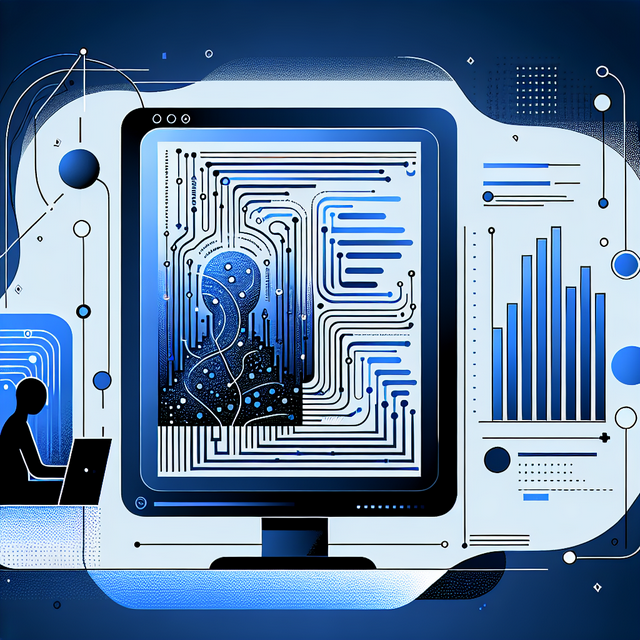
Optimizing Developer Productivity with AI Code Analysis
In today’s fast-paced software development landscape, organizations are constantly seeking ways to enhance developer productivity and improve code quality. With the rise of artificial intelligence (AI) in software development, AI-powered code analysis tools have emerged as a game-changing solution. Let’s explore how these innovative tools can revolutionize your development process and boost overall efficiency.
Table of Contents
- Understanding AI Code Analysis
- Benefits of AI-Powered Code Analysis
- Implementing AI Code Analysis in Your Workflow
- Overcoming Challenges in AI-Assisted Coding
- The Future of AI in Software Development
Understanding AI Code Analysis
AI code analysis utilizes machine learning algorithms to examine source code, identify patterns, and provide insights that can improve code quality and developer efficiency. Unlike traditional static code analysis tools, AI-powered solutions can learn from vast amounts of code and adapt to specific coding styles and best practices.
According to a recent study by Gartner, organizations that implement AI-powered development tools can expect to see a 40% increase in developer productivity by 2025. This significant boost underscores the transformative potential of AI in software development.
Benefits of AI-Powered Code Analysis
Implementing AI code analysis tools in your development process can yield numerous benefits:
-
Enhanced Code Quality: AI algorithms can identify potential bugs, security vulnerabilities, and code smells more accurately than traditional tools.
-
Improved Developer Productivity: By automating repetitive tasks and providing intelligent suggestions, developers can focus on more complex problem-solving.
-
Faster Code Reviews: AI-powered tools can pre-review code, highlighting areas that require human attention and streamlining the review process.
-
Consistent Coding Standards: AI can enforce coding standards across large teams, ensuring consistency and maintainability.
-
Continuous Learning: As AI tools analyze more code, they become more effective at identifying patterns and providing valuable insights.
Implementing AI Code Analysis in Your Workflow
To effectively integrate AI code analysis into your development process, follow these steps:
-
Choose the Right Tool: Select an AI code analysis platform that aligns with your organization’s needs and tech stack.
-
Set Up Integration: Integrate the chosen tool with your existing development environment and version control system.
-
Define Custom Rules: Configure the AI tool to adhere to your organization’s specific coding standards and best practices.
-
Train Your Team: Provide training to developers on how to interpret and act on AI-generated insights.
-
Monitor and Iterate: Regularly assess the impact of AI code analysis on your development process and adjust as needed.
-
Leverage AI-Generated Metrics: Use AI-powered analytics to gain insights into your development process and make data-driven decisions.
-
Ensure Compliance: For regulated industries, configure AI tools to check for compliance with relevant standards and regulations.
By following these steps, organizations can maximize the benefits of AI code analysis and drive significant improvements in their software development lifecycle.
Overcoming Challenges in AI-Assisted Coding
While AI code analysis offers numerous benefits, it’s essential to address potential challenges:
-
False Positives: AI tools may occasionally flag issues that aren’t actually problems. Human oversight remains crucial.
-
Over-Reliance: Developers should use AI as a supportive tool rather than a replacement for critical thinking and problem-solving skills.
-
Learning Curve: Teams may require time to adapt to AI-powered workflows and interpret AI-generated insights effectively.
-
Data Privacy: Ensure that your AI code analysis tool complies with data protection regulations, especially when handling sensitive code.
-
Customization: Some AI tools may require significant customization to align with specific organizational needs and coding practices.
By acknowledging and addressing these challenges, organizations can ensure a smooth integration of AI code analysis into their development processes.
The Future of AI in Software Development
As AI technology continues to evolve, we can expect even more advanced capabilities in code analysis and generation. Future trends may include:
- Predictive Coding: AI tools that can anticipate and suggest entire code blocks based on context and requirements.
- Natural Language Programming: The ability to generate code from natural language descriptions, further bridging the gap between human intent and machine execution.
- AI-Driven Architecture Optimization: Tools that can suggest architectural improvements based on analysis of entire codebases and system interactions.
As these advancements materialize, platforms like AI Code Metrics will play a crucial role in helping organizations measure, manage, and optimize their AI-assisted development processes.
Conclusion
AI-powered code analysis is revolutionizing the software development landscape, offering unprecedented opportunities to enhance developer productivity and code quality. By implementing these tools effectively, organizations can stay ahead in an increasingly competitive digital world.
As you embark on your AI-assisted development journey, consider leveraging platforms like AI Code Metrics to gain deeper insights into your development processes and maximize the impact of your AI investments. With the right approach, AI code analysis can be a powerful catalyst for innovation and efficiency in your software development initiatives.
Ready to transform your development process with AI-powered insights? Explore how AI Code Metrics can help you optimize your AI-assisted coding strategies and drive measurable improvements in your software development lifecycle.